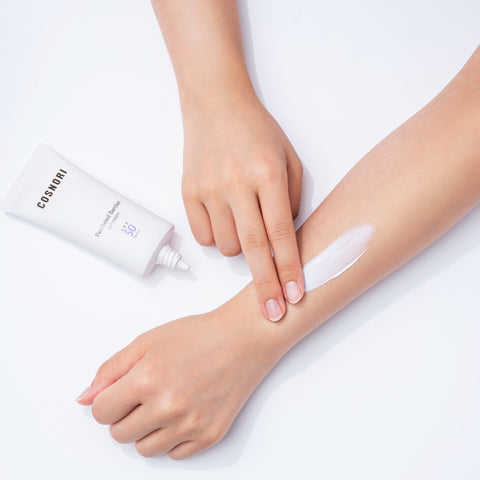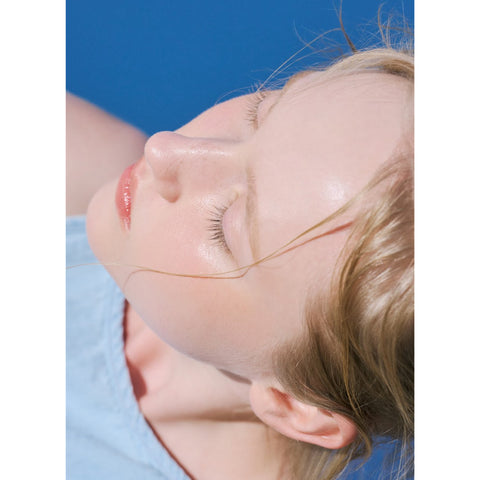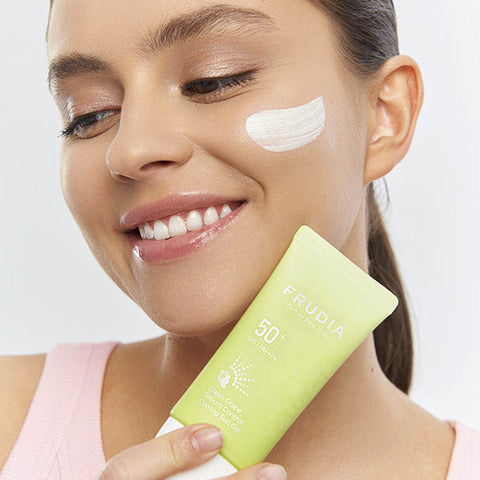Korean sunscreens are known for their advanced formulations, innovative solutions (spf patches and sunscreen sticks as good examples) and their high protection factor. All this is a result of the fact that Korean skin care is based on persistence and prevention.
The sun's UV radiation is the biggest factor in causing the signs of skin aging, and its effect could easily be minimized by using sunscreen. In South Korea, the use of sunscreen starts early in childhood, and it is as routine a part of the day as brushing your teeth.
PA vs SPF labeling
Most of you are already familiar with what the label SPF means in sunscreen. It is one of the most important pieces of information, because SPF tells you how well the product protects against the sun's UVB radiation. The problem is that the skin should also be protected from UVA radiation, and the SPF label does not say anything about this protection factor.
In Korean sunscreens, you will also find the label PA, which is an abbreviation of the term "Protection Grade of UVA". It is a scale that measures the protection level of a sunscreen against UVA rays. UVA rays are longer than UVB and cause less burning, but they have a significant effect on aging of the skin caused by UV radiation, among other things.
So you get the best protection when you choose a product with both a high SPF and a high PA grade. The higher the PA value, the better the sunscreen's protection against UVA rays:
PA+: weak UVA protection
PA++: moderate UVA protection
PA+++: good UVA protection
PA++++: excellent UVA protection
We recommend always choosing a sunscreen with at least SPF 30, Korean products usually have SPF 50, so your skin is definitely protected as well as possible.

What is a good sunscreen
A good sunscreen is one that will be used. That is, it has suitable price point for you and is pleasant to use. If you feel that the sunscreen leaves e.g. an unpleasant feeling on the skin, you should try a different type of sun protection filter or choose a product as light as possible in its composition. One of our favorites is the [SKIN1004] Centella Hyalu-Cica Water-Fit Sun Serum, which, as the name suggests, absorbs into the skin like a serum and does not leave a heavy or sticky feeling.
Chemical or organic sunscreens are usually very light and pleasant to use, and they do not leave a white cast on the skin. The chemical sunscreen filter absorbs the sun's harmful UV rays, preventing them from damaging the skin. Put simply, chemical sunscreen molecules are like little factories that take in UV radiation and convert it into a form (mainly heat) that doesn't cause skin cancer or age the skin (just as much).
Physical i.e. inorganic sunscreen disperses UV radiation away from the skin to some extent (about 5-10%), in addition to the fact that the composition absorbs harmful UV rays, just like chemical sunscreens. But unlike chemical sunscreens, physical sunscreens are not completely absorbed by the skin, which is why they are often richer in texture.
The persistent misconception that physical sunscreens only work by reflecting UV radiation has its roots in a false conclusion from the 70s, which has, however, been disproved several times since then. The most common minerals in physical sunscreens include zinc and titanium oxide, which work essentially the same way as organic (ie chemical) sunscreens; the electrons they contain absorb UV radiation and transform it into a form that is harmless to the skin. Read more about sunscreen myths in our article .
Hybrid sunscreens contain both physical and chemical sun protection filters, which is a very typical solution for Korean sunscreens. In this way, the best aspects of both types can be utilized; the beautiful end result provided by the physical protection by slightly covering the pores, and the light and fresh composition brought by the chemical filter.

Nano filtration
Some physical sunscreens are labeled non-nano filter or nano-filter. Sunscreens use nano-sized mineral particles to reduce the white cast left by the cream on the skin. But the smaller the particle is made, the easier it is also to be absorbed by the skin. Non-nano filter means that no nano-sized particles have been used in the product, so in principle the minerals cannot be absorbed into the skin.
This stems from the possible adverse effects of zinc oxide and titanium dioxide nanoparticles can cause in the body, especially when combined with UV radiation. However, so far in the studies, these nanoparticles have not been able to penetrate the skin very deeply, only in the uppermost dead skin layer of the skin.
However, it is theoretically possible that those nanoparticles could be absorbed deeper if the skin is broken, but there is no more detailed research information on this yet and for now these are considered safe for humans to use. Those who feel more comfortable using products with a larger particle size and a lower chance of absorption into the skin should choose a non-nano filter in physical sunscreens.
Does the sunscreen have to be washed off with an oil-based cleansing product?
A big part of the Korean skin care routine includes double cleansing in the evenings. First, make-up, sunscreen, dirt and sebum are washed from the face with an oil-based cleansing product, and then the face is washed with a water-based cleansing product.
Although double cleansing is definitely recommended, as gentle but thorough cleansing is the first step to healthy skin, it is not absolutely necessary to use an oil-based product to remove sunscreen. However, this depends on the composition of the sunscreen, for example particularly water-resistant creams often require more effective cleansing.
The best sunscreens
Yeppo customers' long-lasting sunscreen favorites are definitely:
Especially for dry skin: [Beauty of Joseon] Relief Sun : Rice + Probiotics
For all skin types, also works instead of moisturizer for oilier skin: [Round Lab] Birch Juice Moisturizing Sunscreen
For all skin types, especially sensitive and acne-prone skin: [SKIN1004] Centella Hyalu-Cica Water-Fit Sun Serum
For all skin types: [Isntree] Hyaluronic Acid Watery Sun Gel
Of course, you can find the best sunscreen for your skin by trying it out!




 info@yeppo.fi
info@yeppo.fi
 14 vrk palautusoikeus
14 vrk palautusoikeus
 PCI-DSS Compliant
PCI-DSS Compliant
 PayPal Buyer Protection
PayPal Buyer Protection
 Klarna – Pay Securely
Klarna – Pay Securely